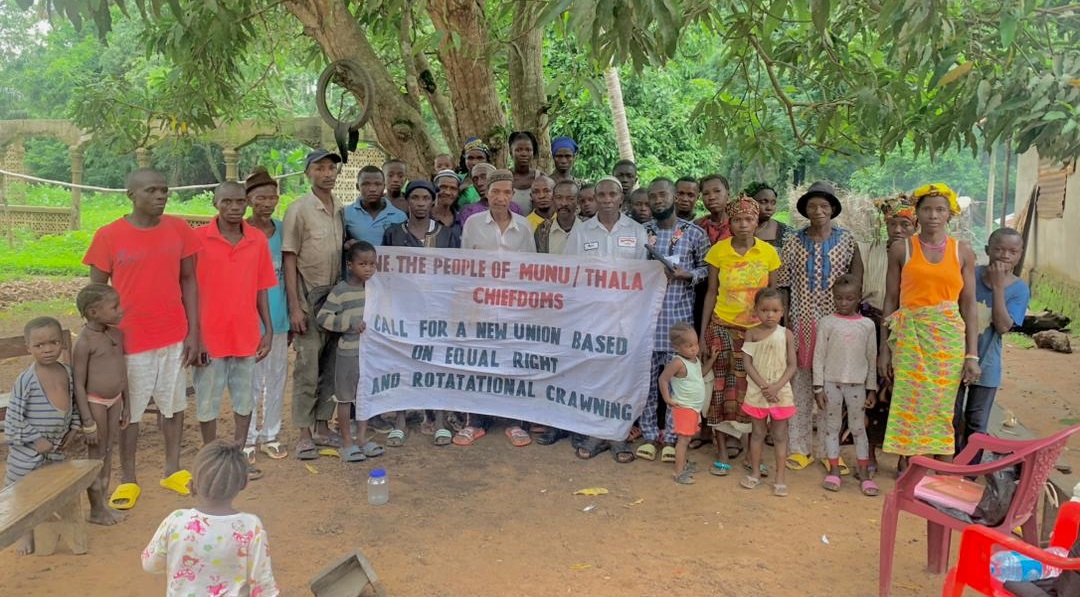The chieftaincy election in Munu/Thala Chiefdom, Kambia District, has sparked significant controversy and allegations of malpractice. The election, held on June 5, 2024, has pitted two main contenders against each other: Yusuf Musa Kamara and Baijakie Kamara. The legal chieftaincy contender, Baijakie Kamara, represents the Bainanie Kabath ruling house, a family with deep-rooted connections to the chieftaincy. However, Yusuf Musa Kamara, who has no known ties to this ruling house, has been accused of attempting to usurp the chieftaincy through political influence, money, and strong connections.
The election process has been fraught with irregularities and accusations of misconduct. Yusuf Musa Kamara initially withdrew from the race after a declaration in December. However, his father, Abass Moray Kargbo, who holds the position of Regent Chief, allegedly intervened privately, allowing Yusuf to re-enter the race. It is claimed that this decision was made without any formal consultation or adherence to the established rules governing the chieftaincy elections.
Following this intervention, Yusuf Musa Kamara was reportedly provided with a ballot box under questionable circumstances. The opposing camp, led by Baijakie Kamara, challenged this decision and took the matter to court in Freetown. Despite being summoned multiple times, Yusuf allegedly used his influence and financial resources to avoid court appearances, thereby delaying the legal proceedings.
The initial election date was set for January 12, 2024. However, due to the petition filed by Baijakie Kamara’s camp, the election was suspended. Despite this suspension, a re-declaration was held on May 21, 2024, which Baijakie’s supporters vehemently disagreed with. They argued that the court had not yet issued a ruling on the matter, and any re-declaration was premature and illegitimate.
The May 21 re-declaration followed a similar pattern to the earlier events, with accusations of manipulation and disregard for legal procedures. Consequently, Baijakie Kamara’s camp filed another petition in court immediately after Yusuf was declared the winner unconditionally, without any legal voting from the Traditional Authorities (TA).
In an effort to present a balanced story, an attempt was made to reach Yusuf Musa Kamara to get his side of the story regarding the allegations against him. Initially, Yusuf promised to provide his perspective but subsequently failed to follow through on this commitment. This lack of response has further fueled suspicions and frustrations among Baijakie Kamara’s supporters and the broader community.
The ongoing court case has seen Yusuf Musa Kamara fail to appear at two different court sittings. This continued absence has raised concerns about the integrity of the electoral process and the influence wielded by certain individuals over the judicial proceedings. Baijakie Kamara’s camp argues that Yusuf’s absence and the alleged manipulation of the election process underscore the need for government intervention to ensure fairness and transparency.
The situation in Munu/Thala Chiefdom remains tense and unresolved. The allegations of election malpractice have created a rift within the community, with many calling for a thorough investigation and government intervention. The supporters of Baijakie Kamara insist that the rightful owner of the chieftaincy should be determined through a transparent and fair process, free from external influences and manipulations.
The community’s call for government intervention is not only about restoring peace but also about upholding the principles of justice and fairness. They argue that the chieftaincy should be a symbol of unity and leadership, and any attempt to undermine this through dubious means should be thoroughly investigated and rectified.
The chieftaincy election in Munu/Thala Chiefdom, Kambia District, has brought to light serious allegations of malpractice and manipulation. The ongoing court case and the failure of Yusuf Musa Kamara to respond to the allegations or appear in court have added to the community’s concerns. As the petition by Baijakie Kamara remains in court, there is an urgent need for government intervention to ensure that the chieftaincy is restored to its rightful owner through a transparent and fair process.
The resolution of this issue is crucial not only for the immediate parties involved but also for the broader community, which looks to the chieftaincy for leadership and guidance. Ensuring that the election process is free from manipulation and influence is essential for maintaining trust in the traditional leadership structures that play a vital role in the social and cultural fabric of the region.











